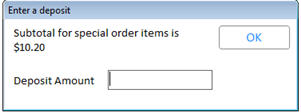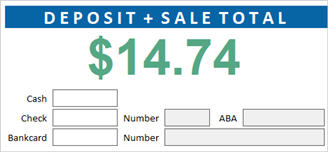Adding Special Order Items to a Sale Transaction
If a customer is making a purchase, but also wants to special order
something, you can create one transaction to accomplish both tasks. This
type of transaction is called a "mixer."

You
must have security bit 599 "Allow special order item or NIF SKU to
be added to a sale" to use this feature. Additionally, if you want
to allow special ordering an item not in Inventory Maintenance, you must
have security bit 612 “Allow special order NIF SKU”.
Do the following:
- Create a sale transaction as you normally would.
- To add a special order item to the sale, type
the item's SKU in the SKU box, and select Special Order (F4). Then
proceed as you normally would to special order the item. Notice that
"SO" displays in front of the item's description, indicating
that this item is a special order.

- If you want to special order an item that is
not in Inventory Maintenance but is in your vendor’s electronic catalog,
set option 260 “Search catalog at POS?” to Y. During the transaction,
type in the catalog SKU, and when you get message to add to inventory
answer Yes, then post the item, press Change, and then press Special
Order.

Posting
a template SKU for the special order item is supported.
- When you have added all the sale and special order items
to the transaction, click Total. The Deposit dialog box displays,
showing the subtotal of only the special order items.

Note: once you have pressed Total, you can
not press Clear or Escape to go back to posting items. However,
you can click Void to void the transaction and start again.
- In the Deposit Amount box, enter a deposit amount
or leave it blank. Click OK. The Total Due dialog box displays, showing
the total of the sale items and tax, plus the deposit.

- Enter the amount tendered, and press ENTER.
Note: You
can not use alternate tender.
Both a receipt for the merchandise purchased
and a copy of the special order print.

If a
customer wants to split tender, you must use the following procedure.
For example, the customer wants to put the deposit on a bankcard,
but wants to pay cash for the sale items.
- Don't enter a deposit amount in the Deposit
dialog box.
- Tender the payment due for the amount of the
sale items.
- Recall and Total the special order, enter
the amount of the deposit in the Deposit dialog box, and tender
the deposit.
![]()




![]()